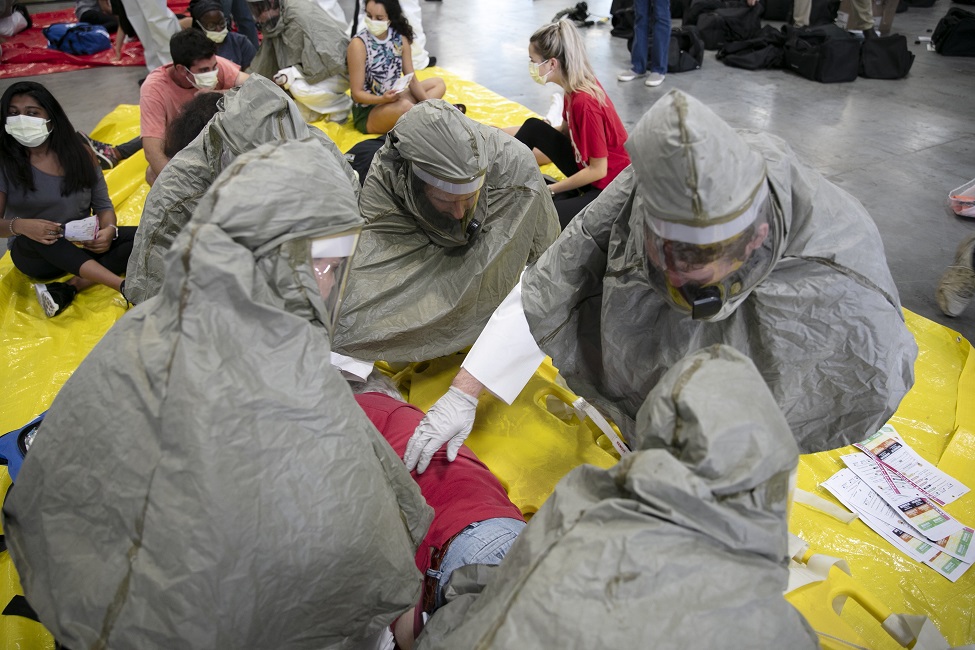FAU Emergency Medicine Resident Physicians Train for Coronavirus

FAU resident physicians had to swiftly put on their protective gear and slip into chemical, biological, radiological, and nuclear (CBRN) and powered, air-purifying respirator (PAPR) suits for the coronavirus simulation at FORTS Medical in Coconut Creek. (Photo by Alex Dolce)
The world is at the brink of a pandemic as officials rush to contain the spread of the novel coronavirus. With seven reported cases in Florida to-date, emergency medicine resident physicians from Florida Atlantic University’s Schmidt College of Medicine prepared for the threat of a coronavirus (COVID-19) contagion using a simulated or “mock” disaster scenario.
About 100 people participated in the half-day simulation at FORTS Medical in Coconut Creek, including local nurses, paramedics, and student and community actors. The coronavirus simulation involved a cruise ship dock-setting scenario with mock cruise ship passengers who were exposed to the virus and were presenting with symptoms from this infectious disease. Transported by bus, the mock passengers stormed into the large warehouse to challenge 18 of FAU’s emergency medicine resident physicians to react and respond quickly to triage the patients.
For the exercise, FAU emergency medicine resident physicians had to swiftly put on their protective gear and slip into chemical, biological, radiological, and nuclear (CBRN) and powered, air-purifying respirator (PAPR) suits, which completely covered their face and body. They were tasked with assessing the level of sickness of each of the passengers and had to organize them into three groups depending on their symptoms. Patients with life-threatening symptoms who needed immediate attention were placed in the RED zone; those with less severe symptoms were placed in the YELLOW zone, and those with mild symptoms were placed in the GREEN zone.
“As part of training our emergency medicine resident physicians we regularly practice for large-casualty events like a bombing, mass shooting or natural disaster,” said Patrick Hughes, D.O., director of FAU’s emergency medicine simulation program and an assistant professor of integrated medical science in FAU’s Schmidt College of Medicine. “To prepare for a pathogen pandemic such as coronavirus, we wanted to provide our residents with the experience of delivering medical care during a chaotic situation while wearing bulky CBRN and PAPR suits and other protective gear. It also was critical to ensure that they effectively communicated with other emergency workers on the team during this process.”
Following the coronavirus simulation, Hughes had a debriefing with FAU’s resident physicians, nurses and first responders on what worked best and areas that could be improved.
“Practice makes perfect and we want to prepare for the worst and hope for the best,” said Hughes. “We hope we don’t have to use the skills our resident physicians learned today, but if we do, we’ll be ready.”
The inaugural class of FAU’s emergency medicine residency began in 2017, and the program focuses on training exceptional clinical emergency medicine physicians with an innovative curriculum. The program is approved by the Accreditation Council for Graduate Medical Education and is spearheaded by Lisa M. Clayton, D.O., program director.
-FAU-
Tags: education | medicine | faculty and staff | coronavirus